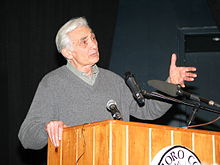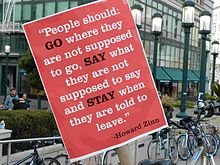Occupy Oakland, November 12, 2011, Howard Zinn quotation
The Outer Limits of Empire: A Tomdispatch Interview with Howard Zinn
He's tall and thin, with a shock of white hair. A bombardier in the great war against fascism and an antiwar veteran of America's wars ever since, he's best known as the author of the pathbreaking A People's History of the United States, and as an expert on the unexpected voices of resistance that have so regularly made themselves heard throughout our history. At 83 (though he looks a decade younger), he is also a veteran of a rugged century and yet there's nothing backward looking about him. His voice is quiet and he clearly takes himself with a grain of salt, chuckling wryly on occasion at his own comments. From time to time, when a thought pleases him and his well-used face lights up or breaks out in a bona fide grin, he looks positively boyish.
We sit down on the back porch of the small coffee shop, alone, on a vacation morning. He has a croissant and coffee in front of him. I suggest that perhaps we should start after breakfast, but he assures me that there's no particular contradiction between eating and talking and so, as a novice interviewer, I awkwardly turn on my two tape recorders -- one of which, on pause, will still miss several minutes of our conversation (our equivalent, we joke, of Nixon's infamous 18-minute gap). In preparation, he pushes aside his half-eaten breakfast, never to touch it again, and we begin.
Tomdispatch: You and Anthony Arnove just came out with a new book, Voices of a People's History of the United States, featuring American voices of resistance from our earliest moments to late last night. Now, we have a striking new voice of resistance, Cindy Sheehan. I was wondering what you made of her?
Howard Zinn: Often a protest movement that's already underway -- and the present antiwar movement was underway even before the Iraq War began -- gets a special impetus, a special spark, from one person's act of defiance. I think of Rosa Parks and that one act of hers and what it meant.
TD: Can you think of other Cindy Sheehan-like figures in the past who made movements coalesce?
Zinn: In the antiwar movement of the Vietnam years, there wasn't one person, but when I think back to the abolitionist movement, Frederick Douglass was a special figure in that way. When he came north, out of slavery, and spoke for the first time to a group of antislavery people, the beginnings of a movement existed. [William Lloyd] Garrison had already started [his antislavery newspaper] the Liberator, but Frederick Douglass was able to represent slavery itself in a way that Garrison and the other abolitionists could not. His dramatic appearance, his eloquence, provided a special spark for the abolitionist movement.
TD: I guess Cindy Sheehan also represents something that can't be represented by anyone else, almost, in fact, can't be represented -- the American dead in the war and, of course, her own dead son.
Zinn: It's interesting. There have been mothers other than Cindy Sheehan who have spoken out, but she decided on an act that had a special resonance, which was simply to find where Bush was going [he chuckles to himself at the thought] and have a confrontation between the two poles of this war, between its maker and the opposition. She just parked herself near Bush and became the center of national attention, of gravity, around which people gathered, hundreds and hundreds of people.
Read More Here



No comments:
Post a Comment
Hello and thank you for visiting my blog. Please share your thoughts and leave a comment :)